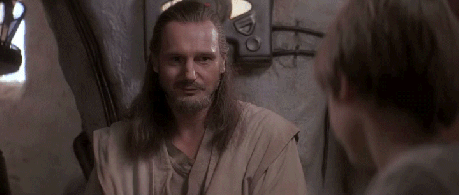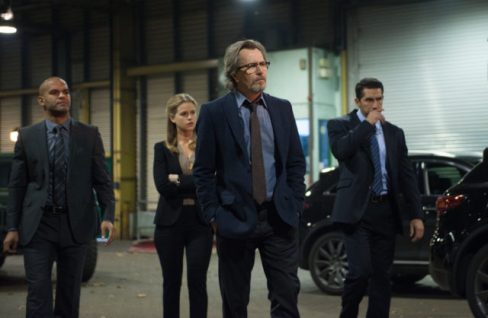I went to go see Criminal last week on a Friday afternoon, by myself. Admittedly, 4:45PM is not necessarily when the big crowds roll in, but it still counts as the weekend, so I was surprised to find that I had the theatre all to myself. I knew the movie had pretty much bombed on its opening weekend (the death knell for all wide releases), but it’s still a big action movie with a bunch of familiar faces, so the completely empty seats seemed undeserved. Well, not so fast– Criminal is not a good movie.
Note: This post is part of an ongoing project, the goal of which is to watch and contemplate every movie in which actor Gary Oldman has appeared (there are many, the man likes to work). Posts tend to contain reviews but are not excluded to that sort of framework– much like Gary’s career, I’m wildly unpredictable!
As with all MYWG entries, the following will probably contain spoilers!
- Criminal’s ranking on the Oldometer: 3/10
- Gary Oldman character quality: Quaker Wells is probably the lamest character Gary has ever saddled himself with. I don’t know if 80% of him ended up on the cutting room floor or something, but the final product that is Quaker is the most nonsensical part of this movie, and that’s saying ALOT.
- Does Gary die in this one? No. That would have given him too much to do.
It’s not a BAD movie, either, for the record. It has a coherent narrative and I wouldn’t say it’s convoluted in the way that some recent thrillers have been, but despite some nice work here and there from Kevin Costner (though even that’s been contested– maybe if he didn’t grunt so much), as a depraved man (named Jericho) with the empathetic part of his brain missing until he receives a memory transplant from Dead Ryan Reynolds, Gal Godot (with not much to do, though she does what she can– also, she’s stunning), and whoever this movie’s editor was, this one is a pretty lame excuse for a popcorn flick. I don’t require my action movies to reach great emotional depths or to have incredibly involving storylines, but I do hope for something I haven’t seen 10 times before. And maybe a character or two that give me reasons to root for them. In this film’s defense, though, the thriller is a genre that has been phased out in the past 15 years or so since its heyday in the 90’s, and, strangely, the only thriller hero we seem to accept these days is Liam Neeson, and more power to him, but I digress.

The movie starts with CIA guy Ryan Reynolds, who’s stashed a willing-to-rat-on-his-boss terrorist and also a bag of money which I now can’t remember the importance of. Speaking of memory failure, Reynolds is killed in action, much to the annoyance of Quaker Wells (Gary Oldman), who puts Tommy Lee Jones’s Dr. Franks (not a whole lot of subtlety goin’ on with that name, hm?) on the case. Jones has been pioneering research on memory extraction, and the CIA NEED Reynolds’s memories to finish what they’ve started. The only appropriate recipient for these dead guy memories is the unstable caveman Costner, probably because he won’t be missed if he dies during the experiment (how do we know he’s a bad guy? He dwells in a super gross cell by himself, where he passes most of his time by grunting, and he totally pinches the doctor’s female assistant on the butt). Also, as aforementioned, he is missing a part of his brain, thus making room for Reynolds stuff.

What of Gary’s role in this movie? Well, I’ve read a few reviews that state he’s never phoned it in so much in his career, but I think the hologram award goes to Tommy Lee Jones, whom I love, but who spends all of his screentime looking like he’s been tricked into being here and he’s very bummed out about it. Gary’s performance isn’t BAD; he yells alot, which I always enjoy, but it’s kind of hard to phone in a role if that role barely exists. Wells pops in and out of the movie to growl at Costner, but only for a few seconds at a time. That would be fine, as we all know what Oldman can do with a character given a few seconds, but Wells is hardly a character. The only moment where we get any information about the man is when his assistant mentions that Wells, like Costner’s psychopath, came from nothing, but even this tidbit is somewhat hackneyed.

The main problem with Wells is that he’s just a moron, especially considering the fact that he’s tops in the CIA. After the operation to install Ryan Reynolds’s memories into Costner’s head, Wells interviews Costner for three minutes, demands to know if he can recall anything, and when Costner can’t instantly tell Wells the details that he wants to know, Gary determines that the whole experiment is a failure, Tommy Lee Jones is a failure, they’re all failures!!! He then flies out of the room, telling his underlings to “take out the trash” (actual quote).

No mention is made of giving Costner some recuperation time after having a major BRAIN SURGERY (and the first of its kind), for him to adjust to his new head and the physical pain that accompanies it, or for, you know, Reynolds’s precious memories to resurface. Naturally, Costner then escapes, attempts to rape Gal Godot, realizes he can speak French, and eventually suffers from the awareness that he really has begun to share his head with an actual Good Guy. This is of course supposed to be transformative and it leads to him evading the CIA approximately 100 times, saving the day, and, most importantly, building a real human connection with the family that Reynolds left behind.
Later, Wells displays more idiocy by failing to bargain with Costner whatsoever, allowing himself to be caught in a headlock by the guy, lacking the foresight to protect Reynolds’s widow and child from Costner (or the terrorists, or anyone else with a phonebook), not preventing his equally dumb CIA goons from HITTING THE BRAIN SURGERY GUY IN THE HEAD REPEATEDLY, and a dozen other cinema sins that simply prevented any kind of suspension of disbelief. The worst of these, however, is that after chasing this once-incarcerated mad man who now has the brains of a CIA operative and threatens the safety of the Western World, Wells suddenly turns into a chipper grandpop and chuckles as he mentions that he plans to OFFER COSTNER A JOB.

All of this might serve to explain why I didn’t bother to invite anyone to see this movie with me, but I actually did enjoy being its sole audience that Friday afternoon. In fact, solo movie-going has become a pretty common practice for me over the years. Napoleon Dynamite was the first movie I went to see by myself; I think I was 15 or 16 at the time, and I recall thoroughly enjoying the experience. My family had just made one of our many cross-country moves (back to California, in this case. My family has a relationship with California that I would compare to Liz Taylor and Richard Burton’s, but that’s a blog post for another time).
This continued to be a regular activity for me as I began to take dual credit courses at my local community college, a period in my life where I found myself so solitary and bored that sometimes I’d just catch the bus to the local movie house after class and see two or three movies in a day (I remember one of these was Life Aquatic, which was the first R-rated movie I ever saw by myself in the theatre. Cinephiles remember these things). I’d spend way too much time comparing the showtimes and how long the movies were to insure a smooth transition, and sometimes the theatre clerks would even turn the other way when I didn’t feel like paying for my second feature (motivated by pity or lack of interest? I’ll never know). Finally, I made friends (amazing, considering the information I have just recounted, but I probably didn’t share too much with them about what I did in my spare time), and hurrah, I had movie buddies (and you know, people to hang out with) again until the next move happened, and since that time the pattern has repeated itself. I’ve been in my current location for over a year, but despite knowing some very nice people, I find myself going to the movies by myself more often than not.

It’s hard to really connect with people, I think. While I’m an introvert, I have a wide variety of surprisingly close friends, something I honestly chalk up as being the one miracle I get in this life. I lucked out. Lest you think me a shut-in or something, I should comment that I’m a generally friendly person and I don’t think I’ve ever been told that I’m quiet. I have enough social empathy to tell when someone is uncomfortable or having a good time, I’ve been told that I’m not awkward, I can chitchat as well as the next person.
Like most introverts, though, I get worn out by people, especially if they’re not easy enough for me to connect with. I’m sure we all know the feeling of having a lot to say but just needing the right person to receive it, and when that person doesn’t materialize, sometimes you find your own efforts to extend yourself to others as insincere or, if they are sincere, somewhat useless. Sometimes I’d just rather not waste my social energy when it’s not called for, it feels so much more rewarding to speak with someone who’s already on your wavelength and is interested in what you might say. I dislike when I find myself in a conversation with someone else and notice enthusiasm fleeting once they realize that same thing: I can’t have a rewarding conversation with this girl. I mean, I believe we can all have meaningful conversations with each other, I suppose, but it takes ALOT of work. At 28, I just feel too old for that. I’d rather be working on something of my own than spending time in a conversation I’m not getting anything out of, or standing around, clinging to my plastic cup for dear life at a social function where I don’t know anyone.

Again, I’m not implying I don’t have good friends here or anywhere else I’ve lived. But they’re rare, and they seem harder to come by as I get older. So I go to the movies alone, I get Thai take-out and eat it in my car if I don’t feel like going home, and I can’t remember the last time I didn’t travel by myself. I’ve never disliked doing things this way, and I’m used to it.
Leading the loner lifestyle is a good thing for some, and as it is somewhat my own lifestyle I, naturally, am a bit defensive of it. I’m of the opinion that it’s good for everyone to experience being alone at some point in their lives, and I’m even a little disapproving of those who never have. How else do you get work done? How do you learn self reliance? I think constantly being surrounded by other humans can lead to dependency, distraction, and lack of growth. I think it’s difficult to form your own opinions when you’re always in the company of someone else. Going to the movies is a great example– when I saw the movie Sisters I did so with a good friend of mine, and we laughed so much together that it endeared the movie to me, but Sisters is not a great movie (I love you, Amy Poehler, but it’s just not). I treasure independence because it lets me make up my own mind without the distraction of other opinions.

Of course… there is another hand here, right? If we’re talking growth, it may be important to spend time with yourself in order to ascertain your own wants and needs, unattached to a partner or a group of friends, but when we come to that conclusion we can’t leave out the somewhat inconvenient fact that we live in a world full of, you know, people. While I think it’s essential to be able to find your individual purpose, what does that even matter unless you add others into the equation? So much of what we have to figure out as human beings involves others, so whatever our revelations are, we can’t opt to form all of our thoughts on life in a cave, can we (unless you DO actually live in a cave– though in that case you are probably a terrorist. Or being held by terrorists. Are you okay)?

One of the most famous literary loners (there are alot of them, though, aren’t there?), Holden Caufield in Catcher in the Rye, spends most of his time sulking about New York, wondering about ducks and complaining about the world being populated by phonies. I haven’t read Catcher in a decade, probably, but I remember thinking that the story seemed to be barreling towards Holden’s inevitable suicide, or at least Holden attempting his plan of running away and living as a “deaf-mute,” but instead it ends with him talking to his shrink and recounting a beautiful afternoon with his little sister Phoebe. On a rainy day, Phoebe plays hooky and the two of them go to the Central Park Zoo, where Holden is deeply moved as he observes Phoebe’s glee while she she rides the carousel. Catcher in the Rye, it turns out, isn’t a story about moral superiority or the value in being alone, it’s about the life-affirming joy that comes from being involved with others.

Weirdly, that’s actually what Criminal ends up being about, too. Sure, the Costner character literally has to share his brain with a dead guy to develop human emotions, but develop them he does, and the more he taps into deceased Ryan Reynolds’s memories the more he cares for and connects with those around him. Costner starts out as a dude so dangerous that he must be kept in solitary because he literally lacks the capacity for sympathy or empathy and therefore, it’s implied, he can do anything to anyone, no remorse or guilt required. In the end, he saves the day by blowing up the bad guy, but not because he has found a moral center, exactly (he still beats characters to death with lamps and stuff), but because he now cares about Reynolds’s widow and her little girl. It’s human connection that has made him into a “real live boy.” Even his name, Jericho, implies that he once had walls up to keep his terrible monsters at bay, but the Good People in this story have brought those walls down. Being a part of someone’s life hasn’t improved his life, really, but it has improved him.

For all its potential, Criminal is a pretty disappointing movie, but it did succeed in reminding me, the lone theatre-goer in a sea full of empty seats, that while independence is a trait to be treasured, it’s not all there is. Life can be as empty as a Cinemark screening of Criminal at 4:45 in the afternoon if you don’t share it with someone. I’m not knocking the preference for a loner lifestyle, but there’s something to be said for tearing those walls down.


I always enjoy reading your blog. I can’t sympathize with going to the theatre by myself. I like how your experience segues into the theme behind Jericho’s name, and the salvation of human connection.
Catcher in the Rye reference!!!!!
LikeLiked by 1 person
Love this!
Tying the Catcher in the Rye into a post about Criminal AND introversion/being a loner was a particularly nice touch.
Thanks for this!
LikeLiked by 1 person